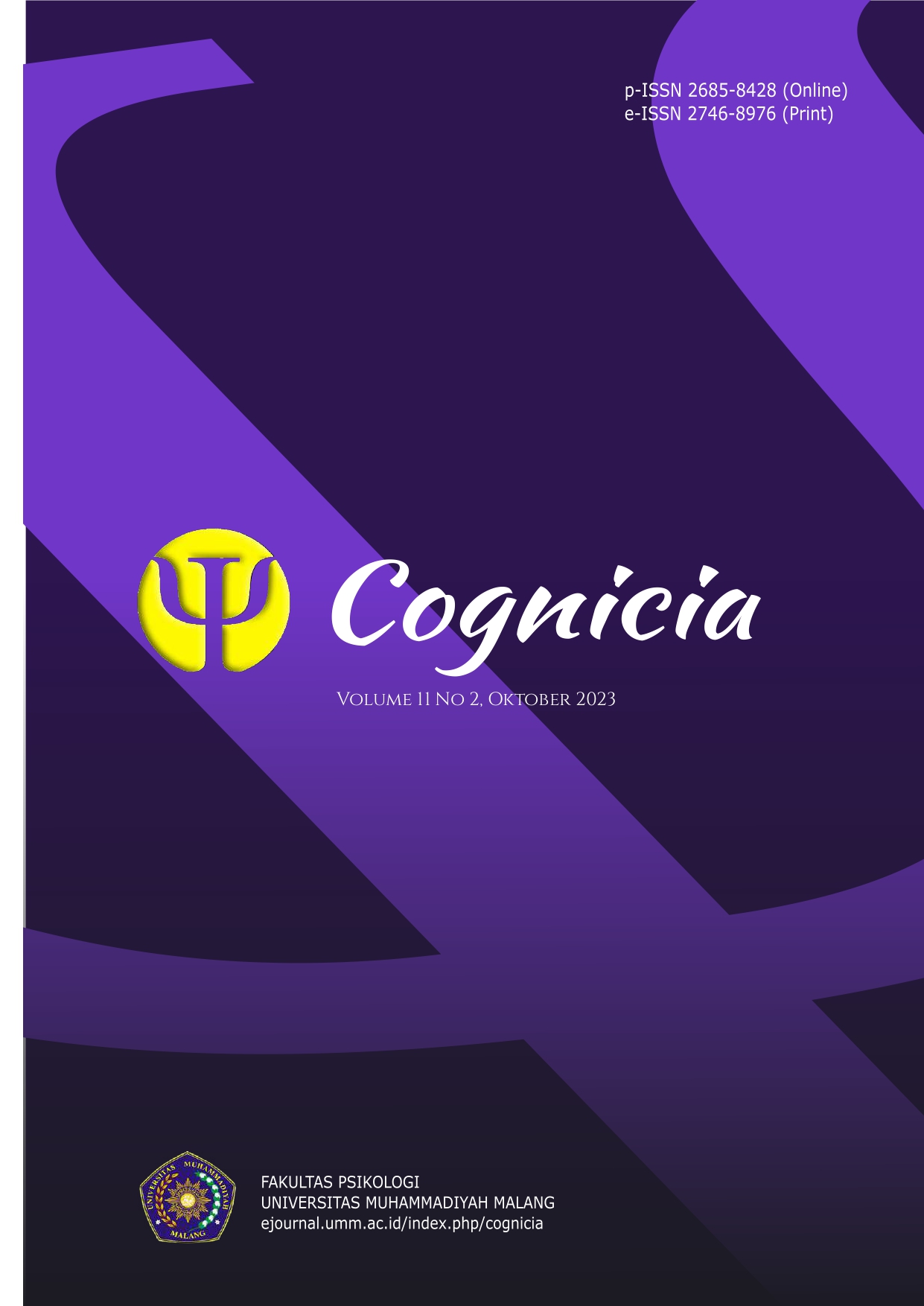Emotion activity education assistance program for therapists and psychologists: Efforts to train emotional regulation skills in children with special needs
DOI:
https://doi.org/10.22219/cognicia.v11i2.28868Abstract
Abstrak. One of the problems Children with Special Needs that needs to be addressed is the ability of children with special needs to recognize various kinds of emotions as well as how to manage the emotions they are feeling so that children with special needs can adjust to all situations they face. This community service activity aims to provide educational assistance to therapists and psychologists for service partners how to train emotional regulation skills in children with special needs using emotional activity media. The goal is that therapists and psychologists can train emotional regulation skills in children with special needs using instruments that are easy to apply, interesting, and fun. This assistance is carried out by using socialization methods and simulating the practice of using emotional activity media to therapists and psychologists. The activity went smoothly and was full of enthusiasm from the participants. Therapists and psychologists are able to understand the importance of emotional regulation skills in children with special needs and know easy, interesting, and fun learning methods for children with special needs.
Keywords : Children with special needs, emotional activities, emotional regulation
Downloads
References
Adhiyastati, M. (2020). Tantangan orangtua dengan anak berkebutuhan khusus. https://skata.info/article/detail/764/tantangan-orang-tua-dengan-anak-berkebutuhan-khusus.
Desiningrum, D., R. (2016). Psikologi anak berkebutuhan khusus. Psikosain.
Nasrulloh, M., Noviadji, B. R., Kristalydia, I. (2019). Perancangan boardgame edukatif untuk mengenalkan cita-cita bagi anak usia 6-9 tahun. Artika, 3(1).
Pratiwi, H. & Mustaji. 2016. Pengembangan lembar kerja anak dengan menggunakan pendekatan konstruktivistik untuk meningkatkan kemampuan SAINS anak usia dini. Jurnal Pendidikan, 1(1).
Redd, H. C., Hurks, P. P. M., Kirschner, P. A., & Jolles, J. (2015). Preshollers’ causal reasoning during shared picture book storytelling: A cross-case comparison descriptive study. Journal of Research in Childhood Education, 29, 367-389, http://www.doi.org/10.1080/02568543.2015.1042126.
Republik Indonesia. (2011). Peraturan Menteri Negara Pemberdayaan Perempuan dan Perlindungan Anak Republik Indonesia Nomor 10 Tahun 2011 tentang Kebijakan Penanganan Anak Berkebutuhan Khusus.
Sudirman, S. B. P., Yulyanti, R. Filda. (2020). Efektivitas wayang kertas dan boardgames terhadap pendidikan kesehatan reproduksi anak SLB. Prosiding Program Kreativitas Mahasiswa.
Tantiani, F., F. (2020). Keterlibatan orangtua dalam intervensi anak berkebutuhan khusus. Jurnal Sains Psikologi, 9(1).
Yolanda, N. S. (2019). Student’s worksheet practicially through cartoons materials in plane. Journal of The Indonesian Matematics Education Society. 1(1).
Zaitun. (2017). Pendidikan anak berkebutuhan khusus. Pekanbaru: Kreasi Edukasi.
Zikrillah, A., Humardhiana, A. (2021). Perancangan media pembelajaran boardgame edumaze untuk jenjang pendidikan Sekolah Dasar. Magelaran: Jurnal Pendidikan Seni, 4(2).
Zubaidah, E. dan Ratnasari, E., M. (2019). Pengaruh penggunaan buku cerita bergambar terhadap kemampuan berbicara anak. Scholaria: Jurnal Pendidikan dan Kebudayaan, 9(3).
Downloads
Published
How to Cite
Issue
Section
License
Copyright (c) 2023 Rahmah Saniatuzzulfa, Moh. A. Hakim, Bagus Wicaksono, Arista Adi Nugroho, Laelatus Syifa Sari Agustina Agustina, Berliana Widi Scarvanovi, Rafika Nur Kusumawati, Zahrina Mardhiyah

This work is licensed under a Creative Commons Attribution-ShareAlike 4.0 International License.
Authors who publish with Jurnal Cognicia agree to the following terms:
- For all articles published in Jurnal Cognicia, copyright is retained by the authors. Authors give permission to the publisher to announce the work with conditions. When the manuscript is accepted for publication, the authors agree to automatic transfer of the publishing right to the publisher.
- Authors retain copyright and grant the journal right of first publication with the work simultaneously licensed under a Creative Commons Attribution-ShareAlike 4.0 International License that allows others to share the work with an acknowledgment of the work's authorship and initial publication in this journal.
- Authors are able to enter into separate, additional contractual arrangements for the non-exclusive distribution of the journal's published version of the work (e.g., post it to an institutional repository or publish it in a book), with an acknowledgment of its initial publication in this journal.
- Authors are permitted and encouraged to post their work online (e.g., in institutional repositories or on their website) prior to and during the submission process, as it can lead to productive exchanges, as well as earlier and greater citation of published wor (See The Effect of Open Access).

This work is licensed under a Creative Commons Attribution-ShareAlike 4.0 International License







